Skip to Comments

Project Kings 👑
About the Aircraft: by Wikipedia

The De Havilland Canada DHC-8, commonly known as the Dash 8, is a series of turboprop-powered regional airliners, introduced by de Havilland Canada (DHC) in 1984. DHC was later bought by Boeing in 1988, then by Bombardier in 1992; then by Longview Aviation Capital in 2019, reviving the De Havilland Canada brand. Powered by two Pratt & Whitney Canada PW150s, it was developed from the Dash 7 with improved cruise performance and lower operational costs, but without STOL performance. Three sizes were offered: initially the 37–40 seat -100 until 2005 and the more powerful -200 from 1995, the stretched 50–56 seats -300 from 1989, both until 2009, and the 68–90 seats -400 from 1999, still in production. The QSeries are post-1997 variants fitted with active noise control systems.
In the 1970s, de Havilland Canada had invested heavily in its Dash 7 project, concentrating on STOL and short-field performance, the company's traditional area of expertise. Using four medium-power engines with large, four-bladed propellers resulted in comparatively lower noise levels, which combined with its excellent STOL characteristics, made the Dash 7 suitable for operating from small in-city airports, a market DHC felt would be compelling. However, only a handful of air carriers employed the Dash 7, as most regional airlines were more interested in operational costs than short-field performance.
In 1980, de Havilland responded by dropping the short-field performance requirement and adapting the basic Dash 7 layout to use only two, more powerful engines. Its favoured engine supplier, Pratt & Whitney Canada, developed the new PW100 series engines for the role, more than doubling the power from its PT6. Originally designated the PT7A-2R engine, it later became the PW120. When the Dash 8 rolled out on April 19, 1983, more than 3,800 hours of testing had been accumulated over two years on five PW100 series test engines. The Dash 8 first flight was on June 20, 1983.
Certification of the PW120 followed on December 16, 1983.
DHC resale

In 1986, Boeing bought the company in a bid to improve production at DHC's Downsview Airport plants, as well as better position itself to compete for a new Air Canada order for large intercontinental airliners. Air Canada was a crown corporation at the time, and both Boeing and Airbus were competing heavily via political channels for the contract. It was eventually won by Airbus, which received an order for 34 A320 aircraft in a highly controversial move. Allegations of bribery are today known as the Airbus affair. Following its failure in the competition, Boeing immediately put de Havilland Canada up for sale. The company was eventually purchased by Bombardier in 1992.
Q-Series -400

The market for new aircraft to replace existing turboprops once again grew in the mid-1990s, and DHC responded with the improved "Series 400" design.
All Dash 8s delivered from the second quarter of 1996 (including all Series 400s) include the Active Noise and Vibration System designed to reduce cabin noise and vibration levels to nearly those of jet airliners. To emphasize their quietness, Bombardier renamed the Dash 8 models as the Q-Series turboprops (Q200, Q300, and Q400).
The last Dash 8-100, a -102, was built in 2005.
In April 2008, Bombardier announced that production of the classic versions (Series 100, 200, 300) would be ended, leaving the Series 400 as the only Dash 8 still in production.
Production of the Q200 and Q300 was to cease in May 2009.
A total of 671 Dash 8 classics were produced; the last one was delivered to Air Nelson in May 2008.[8] The 1,000th Dash 8 was delivered in November 2010.
Production

Bombardier aimed to produce the Q400 more economically. A deal with its machinists union in June 2017 allowed the assembly of the wings and cockpit section outside Canada and searches for potential partners commenced. Bombardier expected to produce the cockpit section in its plant in Queretaro, Mexico, outsourcing the wings to China's Shenyang Aircraft Corp, which already builds the Q400's centre fuselage. The Q400 components are chemically milled while older variants are assembled from bonded panels and skins.
The production of the Dash 8 Series 100 stopped in 2005, and that of the Series 200 and 300 in 2009.
Proposed Q400X stretch

Bombardier proposed development of a Q400 stretch with two plug-in segments, called the Q400X project, in 2007. It would compete in the 90-seat market range. In response to this project, as of November 2007, ATR was studying a 90-seat stretch.
In June 2009, Bombardier commercial aircraft president Gary Scott indicated that the Q400X will be "definitely part of our future" for possible introduction in 2013–14, although he did not detail the size of the proposed version or commit to an introduction date.
As of July 2010, Bombardier's vice president, Phillipe Poutissou, made comments explaining the company was still studying the prospects of designing the Q400X and talking with potential customers. At the time, Bombardier was not as committed to the Q400X as it had been previously. As of May 2011, Bombardier was still strongly committed to the stretch, but envisioned it as more likely as a 2015 or later launch, complicating launch date matters were new powerplants from GE and PWC to be introduced in 2016. As of February 2012, Bombardier was still studying the issue, but as of 2011, the launch date was no longer targeted for the 2014 range. At least a three-year delay was envisioned.
In October 2012, a joint development deal with a government-led South Korean consortium was revealed, to develop a 90-seater turboprop regional airliner, targeting a 2019 launch date. The consortium was to have included Korea Aerospace Industries and Korean Air Lines.
High-density, 90-seat Q400

At the February 2016 Singapore Airshow, Bombardier announced a high-density, 90-seat layout of the Q400, which should enter service in 2018; keeping the 28 in (71 cm) seat pitch of the Nok Air 86-seats, an extra row of seats is allowed by changing the configuration of the front right door and moving back the aft pressure bulkhead. The payload is increased by 2,000 pounds (910 kg) and the aircraft maintenance check intervals are increased: 800 hours from 600 for an A-check and 8,000 hours from 6,000 for a C-check. By August 2018, the 90-seat variant was certified before delivery to launch customer SpiceJet later in the same year. In March 2021, EASA certified the 90-seat variant for European operations; DHC believes that there are opportunities with current and prospective European customers.
Sale to Longview, reviving the De Havilland Canada name

On November 8, 2018, Viking Air parent Longview Aviation Capital Corporation acquired the entire Dash 8 program and the de Havilland brand from Bombardier, in a deal that would close by the second half of 2019. Viking had already acquired the discontinued de Havilland Canada aircraft model type certificates in 2006.
By November 2018, the sales of the higher-performance Q400 were slower than the cheaper aircraft from ATR. Bombardier announced the sale was for $300 million and expects $250 million net. The sale was projected by Bombardier to result in $250 million annual savings.
In January 2019, Longview announced that it would establish a new company in Ontario, reviving the de Havilland Aircraft Company of Canada name, to continue production of the Q400 and support the Dash 8 range. By February, the program sale was expected to close at the end of September.
On June 3, 2019, the sale was closed with the newly formed De Havilland Canada (DHC) taking control of the Dash 8 program, including the previous -100, -200, and -300 series. Production of the Q400 was planned to continue at the Downsview, Toronto production facility, under DHC's management. De Havilland is considering a 50-seat shrink, as North American airlines operate 870 ageing 50-seaters, mostly CRJs and Embraer ERJs.
There were 17 Dash 8s scheduled for delivery in 2021, and De Havilland could pause production after those, while the factory lease expires in 2023.
On February 17, 2021, DHC announced a pause in production, planned for the second half of 2021, due to lack of Dash 8 orders from airlines. The manufacturer planned to vacate its Downsview Toronto facility and lay off 500 employees in the process. The lay-off notice resulted in the union representing the workers demanding a government bail-out. The company plans to restart production after the pandemic at a new location. In July 2022, DHC announced that it would review the Dash 8 programme and supply chain later in the year, and could restart production in the middle of the decade if conditions allow. The Calgary site, where the company produces DHC-6 Twin Otters, would be the likely venue. Potential updates, including hydrogen-electric propulsion, will be studied.
Hydrogen-electric powertrain

In December 2021, DHC entered into a partnership with ZeroAvia with a view to offering the ZA-2000 hydrogen-electric powertrain as an option for the DHC-8, as a line-fit option for new aircraft and as an approved retrofit for existing aircraft. In May 2023, ZeroAvia unveiled a DHC-8 Q400 donated by Alaska Airlines for use as a testbed aircraft.

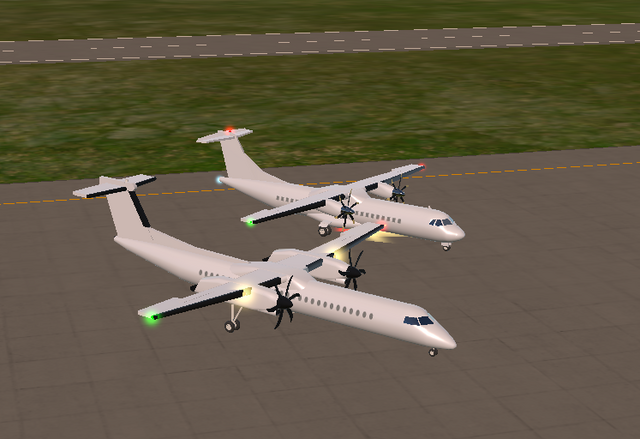
Actual Sample:

Image Credit: Flickr
This aircraft follows all the basic AI requirements. It is specially designed for Artificial Intelligence [AI] to simulate air traffic, it is able to land and take off with extreme precision at the main airports in the game, it is also a playable aircraft, you can enjoy air collisions, target shooting or just enjoy of a more realistic air traffic.
How to make it operational:
Step 1: Download and save this aircraft to your collection
Step 2: Activate in-game AI air traffic in sandbox mode and wait patiently on the ground until the aircraft is spawned
If the aircraft is not spawning, remove decorative details such as lights, letters and numbers on the fuselage, then repeat the process again until the aircraft is spawned in your skies.
Controls: Standard
Thank you for your attention, Good flight!

Free for Livery and Paintings
Specifications
General Characteristics
- Successors 34 airplane(s) +906 bonus
- Created On Android
- Wingspan 140.0ft (42.7m)
- Length 164.8ft (50.2m)
- Height 41.7ft (12.7m)
- Empty Weight N/A
- Loaded Weight 33,666lbs (15,270kg)
Performance
- Horse Power/Weight Ratio 0.118
- Wing Loading 23.5lbs/ft2 (114.8kg/m2)
- Wing Area 1,432.2ft2 (133.1m2)
- Drag Points 6264
Parts
- Number of Parts 86
- Control Surfaces 9
- Performance Cost 536

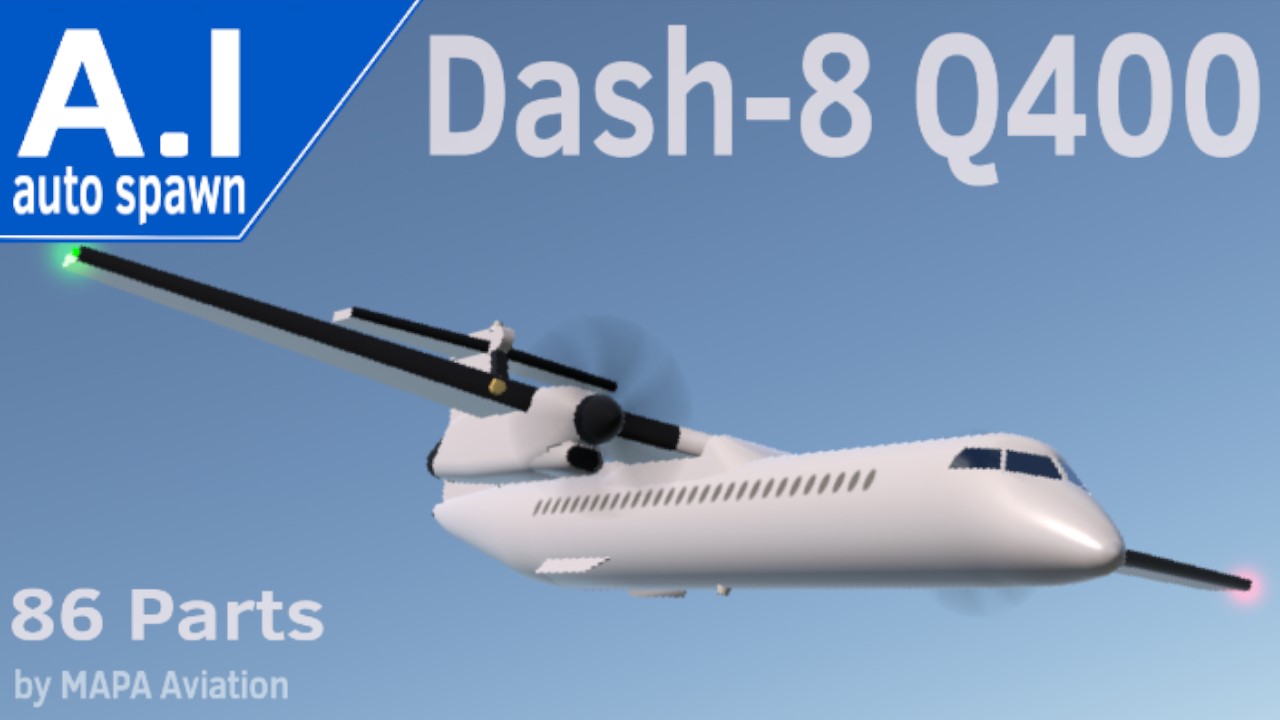
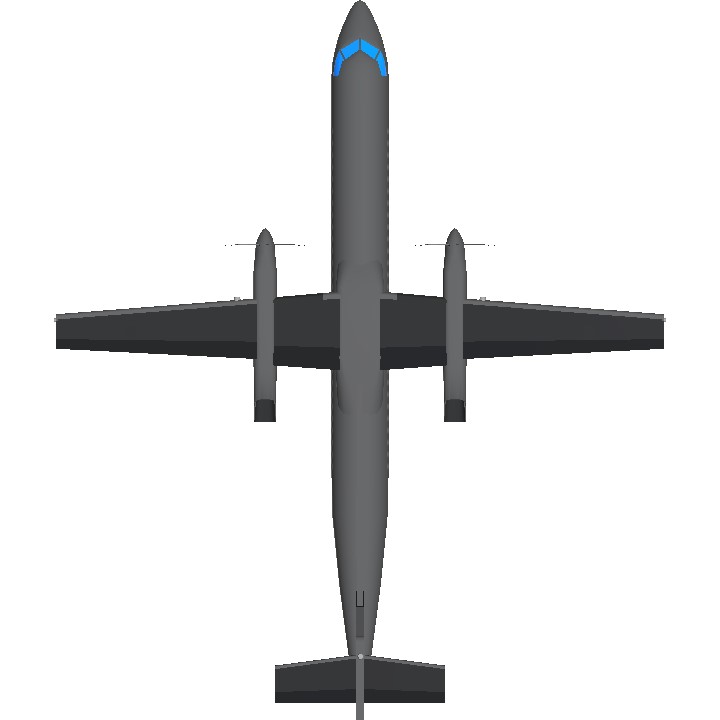
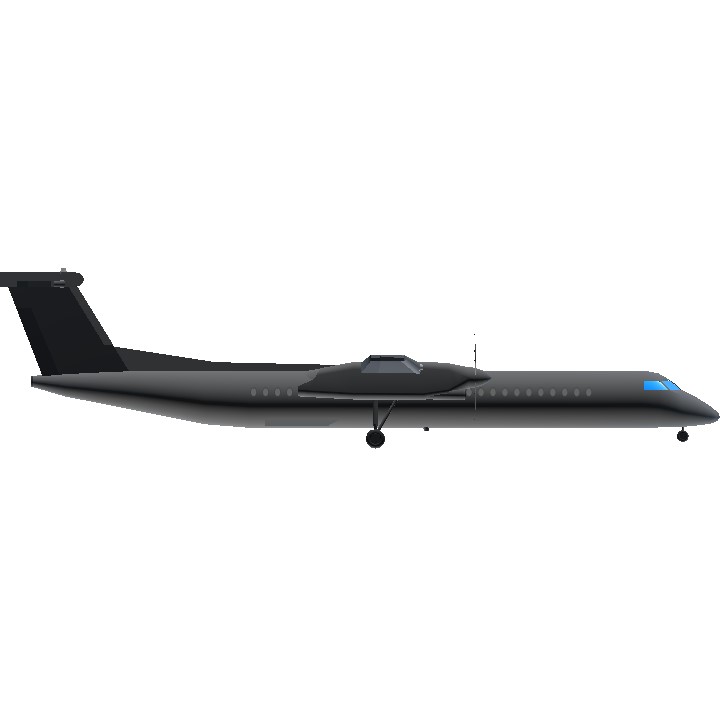
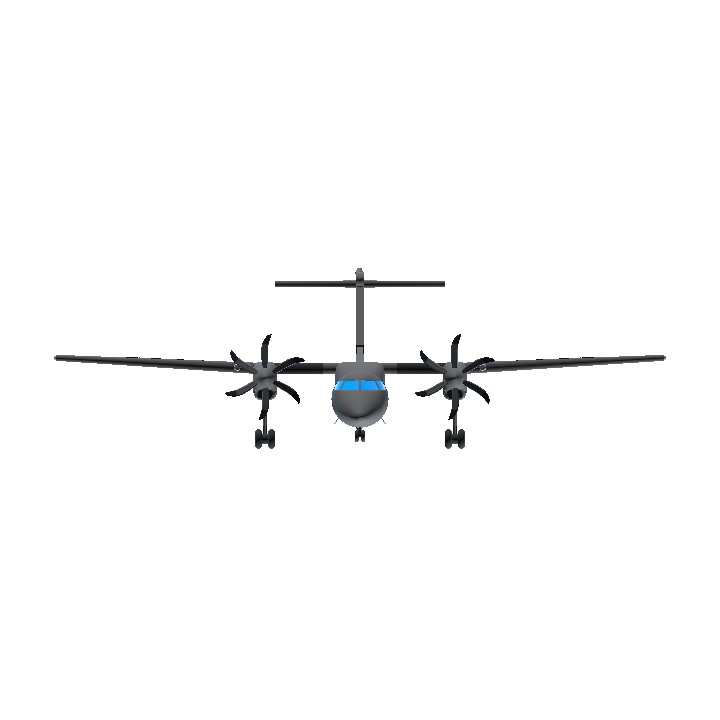
The Dash-8 Q300 and Dash-8 Q200 should be out soon! Wait a few more days, my internet is not good at all
Back to the top
@MAPA can I make a meme with this and yes it is fake
REALISTIC MAKE A ATR-72-600/ATR-72-600F
Great Plane!
(RIP To all the people who died in the Japan Coast Guard Collision)
@AirJMCAviation Yes, this is already in the description of this post
did you know that the Q in Q400 stands for quiet
Sky King reference?
Wow! amazing for just 86 parts! I would even say it flies like the real thing ;)
click this
@WINGSIRONDYNAMIC boa ideia
Great work
MAPA abre um desafio pra todo mundo fazer aeronaves regionais
@MAPA yet another amazing plane of yours! even without good wifi!
What about the dash-8 Q100?
You are almost at 100k points buddy, that’s just impressive.
@NormalCv580enjoyer @WinsWings @9010 Thanks!
Very very very very very good work!👍
Long boi. Nice
sorry about that maby i will be fix next time so you can post the dash 8 300/200 atr42 and the erj 135 140 and 145
Q400
Tome
so cool
Epicly better than the one i made in 29 minutes
@XProAerospaceAircrafts @SkylieAviation @MonsNotTheMonster Thank You!
@Transair56 @CrazyEngine @ZerkkFujimi